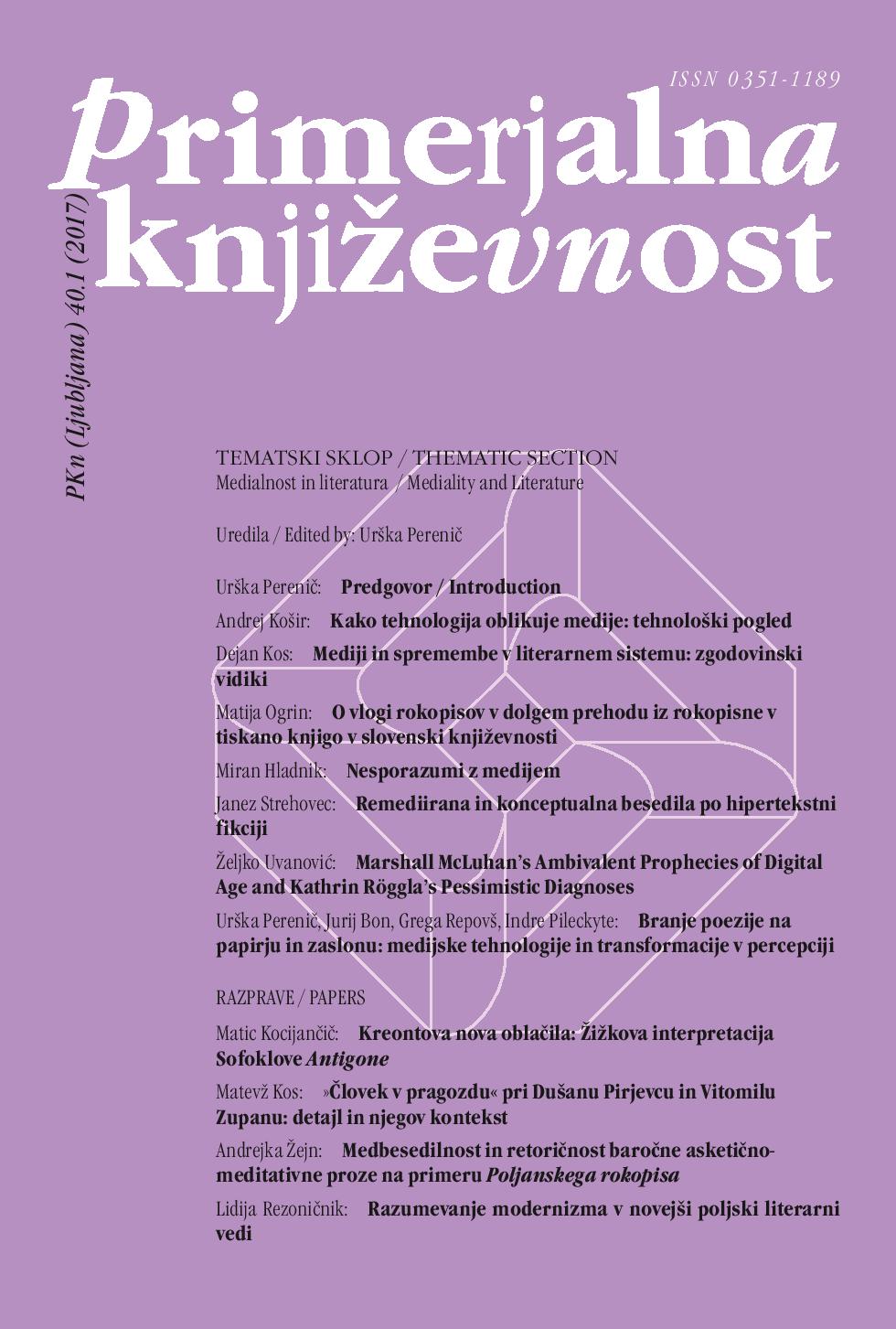Creon’s New Clothes: Žižek’s Interpretation of Sophocles’ Antigone
Keywords:
literature and ethics, Greek drama, Sophocles, Antigone, literary interpretations, Brecht, Bertolt, Anouilh, Jean, Smole, Dominik, philosophical interpretations, Žižek, Slavoj, ethics of violenceAbstract
The article critically evaluates The Three Lives of Antigone, Slavoj Žižek’s first dramatic work. Žižek’s polemical rewriting of Sophocles’ tragedy is examined in the broader perspective of Žižek’s philosophy and other Antigones: those of Sophocles, Anouilh and Brecht. Slavoj Žižek has interpreted Sophocles’ Antigone in numerous philosophical works. In his earlier treatises, he mainly gave a cautious summary of Hegel’s, Heidegger’s and Lacan’s theses on Antigone; lately, however, Žižek’s attitude to Sophocles’ Antigone has grown decidedly negative. The main point in Žižek’s critique of Sophocles’ tragedy is that his Antigone is not an appropriate symbol of genuine social revolt. Based on this conviction, Žižek contrived his own version of Antigone with an alternative ending in which the choir carries out a revolution and condemns Antigone to death. Žižek’s dramatic project fails to convince; rather, it reveals both the author’s dramaturgical awkwardness and his unfamiliarity with some prominent philological and literary interpretations of Greek tragedy. The central political message of Žižek’s play and its conceptual background is also poor: It is essentially a superficial apology for political violence, which can ultimately only be understood as a veiled defense of the political status quo.References
Adams, S. M. »The Antigone of Sophocles«. V: Phoenix, 9.2 (1955): 47–62.
Brecht, Bertolt. Die Antigone des Sophokles. Berlin: Suhrkamp, 1985.
Gray, John. »The Violent Visions of Slavoj Žižek«. V: New York Review of Books, 12. 7. 2012. Splet. 23. 12. 2016.
Hester, D. A. »Sophocles the Unphilosophical. A Study in the Antigone«. V: Mnemosyne 24.1 (1971): 11–59.
Honig, Bonnie. Antigone, Interrupted. Cambridge: Cambridge University Press, 2013.
Hribar, Tine. »Zakaj Žižek na smrt sovraži Antigono?«. V: Sobotna priloga, 7. 11. 2015. Splet. 23. 12. 2016.
Kierkegaard, Soren. Ali-ali. Ljubljana: Študentska založba, 2003.
Lacan, Jacques. Le séminaire, VII. L’éthique de la psychanalyse. Pariz: Le Seuil, 1986.
Leonard, Miriam. Athens in Paris. New York: Oxford University Press, 2005.
Rouse, W. H. D. »The Two Burials in Antigone«. V: The Classical Review 25.2 (1911): 40–42.
Sofokles. Antigona (prev. Kajetan Gantar). Maribor: Obzorja, 1974.
Štefančič Jr., Marcel. »Ljubezen je hladnejša od smrti«. Mladina, 10. 4. 2015. Splet. 23. 12. 2016.
Young, Julian. Philosophy of Tragedy: From Plato to Žižek. Cambridge: Cambridge University Press, 2013.
Žižek, Slavoj. Bolečina razlike. Maribor: Založba Obzorja, 1972.
– – –. Die drei Leben der Antigone. Ein Theaterstück. Frankfurt: S. Fischer Verlag, 2015.
– – –. Eine kontrafaktische Antigone. Hundertvierzehn, 2015. Splet. 23. 12. 2016.
– – –. Enjoy Your Symptom. London: Routledge, 1992.
– – –. For They Know Not What They Do: Enjoyment as a Political Factor. London: Verso, 2008.
– – –. Jezik, Ideologija, Slovenci. Ljubljana: Delavska enotnost, 1987.
– – –. Less Than Nothing: Hegel and the Shadow of Dialectical Materialism. London: Verso, 2012.
– – –. Living in the End Times. London: Verso, 2010.
– – –. Nasilje. Ljubljana: Društvo za teoretsko psihoanalizo, 2007.
– – –. On Belief. London: Routledge, 2001.
– – –. Pogled s strani. Ljubljana: Revija Ekran, 1988.
– – –. »Predgovor: Teci, Antigona, teci!«. Antigona. Ljubljana: Društvo za teoretsko psihoanalizo, 2015. 9–30.
– – –. The Parallax View. Cambridge: MIT Press, 2006.
– – –. The Sublime Object of Ideology. London: Verso, 1989.
– – –. »Trojno življenje Antigone«. Antigona. Ljubljana: Društvo za teoretsko psihoanalizo, 2015. 31–73.
– – –. Welcome to the Desert of the Real. London: Verso, 2002.
DODATEK: Seznam obravnav Antigone v Žižkovih monografijah, objavljenih v angleškem jeziku (1989–2014):
Absolute Recoil: Towards a New Foundation of Dialectical Materialism. London: Verso, 2014 (str. 144).
Did Somebody Say Totalitarianism? Five Interventions in the (Mis)use of a Notion. London: Verso, 2001 (str. 22, 83, 96, 157–168, 173–178, 257, 266).
Enjoy Your Symptom. London: Routledge, 1992 (str. 46, 77, 92, 156, 166, 174).
For They Know Not What They Do: Enjoyment as a Political Factor. London: Verso, 2008, 2. izd. (str. 115, 239).
In Defense of Lost Causes. London: Verso, 2008 (str. 121, 150, 304–306, 346, 467, 483).
Iraq: The Borrowed Kettle. London: Verso, 2004 (str. 74–81, 119).
Less Than Nothing: Hegel and the Shadow of Dialectical Materialism. London: Verso, 2012 (str. 80–86, 100, 301–303, 323, 359, 474–475, 512, 550, 565–568, 575–579, 615–616, 750, 832–834, 873, 967).
Living in the End Times. London: Verso, 2010 (str. 104–105).
On Belief. London: Routledge, 2001 (str. 19, 30, 92, 137, 158).
Organs Without Bodies. London: Routledge, 2003 (str. 205).
Tarrying with the Negative. Durham: Duke University Press, 1993 (str. 45–123).
The Fragile Absolute: Or, Why Is the Christian Legacy Worth Fighting For? London: Verso, 2000 (str. 152–156, 173).
The Fright of Real Tears: Krzysztof Kieślowski Between Theory and Post-Theory. London: British Film Institute, 2001 (str. 23, 140, 169).
The Indivisible Remainder: Essays on Schelling and Related Matters. London: Verso, 1996 (str. 96, 115–117, 171).
The Metastases of Enjoyment: Six Essays on Women and Causality. London: Verso, 1994 (str. 69, 83, 84, 148, 173).
The Most Sublime Hysteric: Hegel with Lacan. Cambridge: Polity Press, 2014 (str. 29, 184).
The Parallax View. Cambridge: MIT Press, 2006 (str. 42, 94, 104, 236, 279, 325, 342, 397).
The Plague of Fantasies. London: Verso, 2008, 2. izd. (str. 121, 154).
The Puppet and the Dwarf: The Perverse Core of Christianity. Cambridge: MIT Press, 2003 (str. 54, 63).
The Sublime Object of Ideology. London: Verso, 1989 (str. 130–131, 150, 161).
The Ticklish Subject. London: Verso, 1999 (str. 49, 160, 170, 263, 321).
The Universal Exception. London: Continuum, 2006 (str. 58–59, 223, 267).
The Year of Dreaming Dangerously. London: Verso, 2012 (str. 105).
Violence. New York: Picador, 2008 (str. 68–70, 194).
Welcome to the Desert of the Real. London: Verso, 2002 (str. 6, 98–99, 142).


